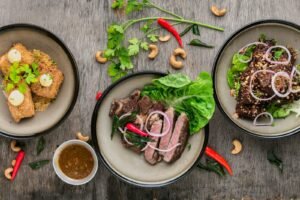7 High Estrogen Foods to Remove from Your Diet

Estrogen is an essential hormone that plays a crucial role in the female reproductive system. However, an imbalance in estrogen levels can lead to various health issues. While estrogen is naturally produced in the body, certain foods can increase its levels, which may disrupt hormonal balance. In this article, we will discuss seven high estrogen foods that you may want to consider removing from your diet.
1. Soy Products
Soy products, such as tofu, soy milk, and edamame, contain high levels of phytoestrogens, which are plant compounds that mimic estrogen in the body. While moderate consumption of soy is generally safe, excessive intake can lead to an estrogen imbalance. If you are concerned about your estrogen levels, it may be wise to limit your intake of soy products.
2. Flaxseeds
Flaxseeds are known for their numerous health benefits, but they are also rich in lignans, which are another type of phytoestrogen. While flaxseeds can be a healthy addition to your diet in moderation, consuming them excessively may contribute to elevated estrogen levels. If you are already dealing with hormonal imbalances, it is advisable to consume flaxseeds in moderation.
3. Dairy Products
Dairy products, such as milk, cheese, and yogurt, can contain synthetic hormones, including estrogen. These hormones are often given to cows to increase milk production. While the levels of estrogen in dairy products are generally low, it is still worth considering if you are trying to reduce your overall estrogen intake.
4. Non-Organic Meat
Non-organic meat, particularly beef and poultry, may contain synthetic hormones that are used to promote growth and increase production. These hormones can disrupt the hormonal balance in your body. If you are concerned about estrogen levels, opting for organic or hormone-free meat may be a better choice.
5. Processed Foods
Processed foods, such as fast food, pre-packaged meals, and snacks, often contain additives, preservatives, and artificial ingredients. Many of these additives can disrupt hormonal balance and may contain xenoestrogens, which are synthetic compounds that mimic estrogen in the body. To reduce your exposure to estrogen-like substances, it is advisable to limit your consumption of processed foods.
6. Alcohol
Excessive alcohol consumption can negatively affect hormone levels in both men and women. Alcohol can increase estrogen levels by interfering with the liver’s ability to metabolize estrogen effectively. If you are concerned about estrogen dominance, it is advisable to limit your alcohol intake or avoid it altogether.
7. High-Fat Foods
Foods high in unhealthy fats, such as saturated and trans fats, can contribute to estrogen dominance. These fats can increase the production of estrogen in the body and disrupt hormonal balance. To maintain a healthy hormonal balance, it is recommended to limit your intake of high-fat foods and opt for healthier fats, such as those found in avocados, nuts, and seeds.
It is important to note that while these foods may contribute to an imbalance in estrogen levels, everyone’s body is different. If you suspect you have an estrogen imbalance, it is best to consult with a healthcare professional who can provide personalized advice and guidance.
In conclusion, being mindful of your diet and making informed choices can help maintain a healthy hormonal balance. By reducing or eliminating high estrogen foods from your diet, you may be able to support your overall well-being and hormonal health.

Comments